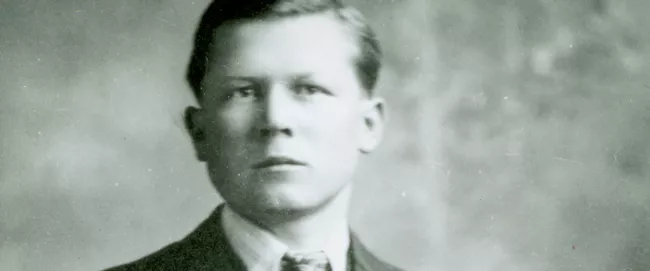From the archives: Lawrence Two-Axe
Learn more about the
city’s history from the Vaughan Archives
From the traditional territories of the First
Peoples of Turtle Island, to a farmland community, to a bustling city centre
and everything in between – Vaughan's transformation is a story worth telling.
As part of a monthly series, the City of Vaughan releases historical content
from the City’s Archives.
Scroll through memory lane, learn about the city's
past and explore the places, people and events that were pivotal to the
development of the Vaughan we know today. This month, the City is highlighting Lawrence
Two-Axe.
Lawrence Two-Axe was originally from the Kahnawà:ke Mohawk reserve in
Quebec. This reserve was established on the south shore of the St. Lawrence
River as part of an area that the French Crown gave to the Jesuits in 1680.
Many band members also lived off the reserve, just as Lawrence Two-Axe’s family
chose to do in the early 20th century.
After leaving the reserve, Lawrence Two-Axe and his family settled in
Pine Grove, a hamlet north of Woodbridge in the city of Vaughan. He was the
representative for the First Nations of North America at the League of Nations,
an international organization that was founded after the Paris Peace Conference
of 1919. The goals of the League included disbarment, preventing war through
collective security, settling disputes between countries through negotiation
and diplomacy, and improving global welfare. They had a mixed track record of
success and effectively ceased operation during the Second World War. The
League of Nations formed the basis of the organization that we know today as
the United Nations.
Lawrence Two-Axe spent most of his life undertaking humanitarian service
and advocating for Indigenous rights. He also acted as the Chairman of the
National Organizational Council of the League of Nations of North American
Indians, the largest Indigenous organization in the world.
ABOUT VAUGHAN ARCHIVES
Established in 1988,
the City of Vaughan
Archives
is home to more than 600 collections, consisting of both City records and cultural
records about Vaughan from 1860 to the present day. Records include, but are
not limited to, the following:
- City business records with long-term legal and administrative value, such as Council meeting minutes, by-laws, assessment rolls, financial records, reports and official correspondence
- church, community and school records
- census records
- historical photographs
- land records
- historical maps, plans and aerial photographs
- newspapers
- personal papers of past residents and founding families, such as diaries, family histories, journals and letters
- records of local organizations both past and present
VIEW VAUGHAN'S ARCHIVES
ONLINE!
The City's Archival
Collection is on digital display for all to explore! The below galleries are
now available in the City's online gallery on Flickr:
- From Township to City: The Evolution of Vaughan
- Featured Artists of Vaughan
- Historical Families of Vaughan
- Historical Figures: Lord Beaverbrook
- Historical Photography
- Recollections of Rural Vaughan
- The Mary Wood Collection
- The Way We Were: Representations of Vaughan's Past
- Vaughan Working Environments
- Vaughan Through the Ages: Medicine
- Vaughan Through the Ages: Music
- Vaughan Through the Ages: Sports and Recreation
- Stories of Remembrance
- Vaughan's Forgotten Heroes
- Early Churches of Vaughan
- Historical Schools of Vaughan
A
personal Flickr account is not required to access the City's online gallery,
which contains only a small selection of the full archives collection. If you
are looking for a particular image, original file, primary source record or
more, please visit the Archival
Database, or contact the Vaughan
Archives by calling 905-832-2281 or emailing archives@vaughan.ca.
By managing and
preserving both City and community records, the Enterprise Information
Management Services team ensures that Vaughan's rich and varied history will
continue to be available for future generations. Learn more at vaughan.ca/archives.

